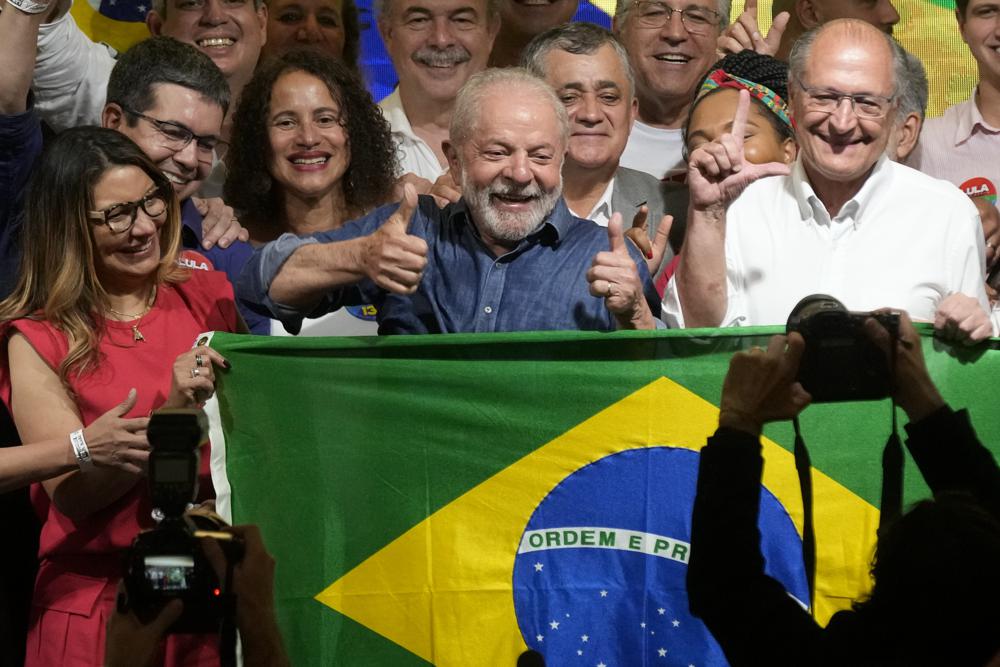Luiz Inácio Lula da Silva has done it again: Twenty years after first winning the Brazilian presidency, the leftist defeated incumbent Jair Bolsonaro Sunday in an extremely tight election that marks an about-face for the country after four years of far-right politics.
With 99.9% of the votes tallied in the runoff vote, da Silva had 50.9% and Bolsonaro 49.1%, and the election authority said da Silva’s victory was a mathematical certainty. At about 10 p.m. local time, three hours after the results were in, the lights went out in the presidential palace and Bolsonaro had not conceded nor reacted in any way.
Before the vote, Bolsonaro’s campaign had made repeated — unproven — claims of possible electoral manipulation, raising fears that he would not accept defeat and would challenge the results if he lost.
The high-stakes election was a stunning reversal for da Silva, 77, whose imprisonment for corruption sidelined him from the 2018 election that brought Bolsonaro, a defender of conservative social values, to power.
“Today the only winner is the Brazilian people,” da Silva said in a speech at a hotel in downtown Sao Paulo. “This isn’t a victory of mine or the Workers’ Party, nor the parties that supported me in campaign. It’s the victory of a democratic movement that formed above political parties, personal interests and ideologies so that democracy came out victorious.”
Da Silva is promising to govern beyond his party. He wants to bring in centrists and even some leaning to the right who voted for him for the first time, and to restore the country’s more prosperous past. Yet he faces headwinds in a politically polarized society where economic growth is slowing and inflation is soaring.
This was the country’s tightest election since its return to democracy in 1985, and the first time since then that the sitting president failed to win reelection. Just over 2 million votes separated the two candidates; the previous closest race, in 2014, was decided by a margin of roughly 3.5 million votes.
The highly polarized election in Latin America’s biggest economy extended a wave of recent leftist victories in the region, including Chile, Colombia and Argentina.
Da Silva’s inauguration is scheduled to take place on Jan. 1. He last served as president from 2003-2010.
Thomas Traumann, an independent political analyst, compared the results to Biden’s 2020 victory, saying da Silva is inheriting an extremely divided nation.
“The huge challenge that Lula has will be to pacify the country,” he said. “People are not only polarized on political matters, but also have different values, identity and opinions. What’s more, they don’t care what the other side’s values, identities and opinions are.”
Congratulations for da Silva — and Brazil — began to pour in from around Latin America and across the world Sunday evening, including from US President Joe Biden, who highlighted the country’s “free, fair, and credible elections.” The European Union also congratulated da Silva in a statement, commending the electoral authority for its effectiveness and transparency throughout the campaign.
Bolsonaro had been leading throughout the first half of the count and, as soon as da Silva overtook him, cars in the streets of downtown Sao Paulo began honking their horns. People in the streets of Rio de Janeiro’s Ipanema neighborhood could be heard shouting, “It turned!”
Da Silva’s headquarters in downtown Sao Paulo hotel only erupted once the final result was announced, underscoring the tension that was a hallmark of this race.
“Four years waiting for this,” said Gabriela Souto, one of the few supporters allowed in due to heavy security.
Outside Bolsonaro’s home in Rio, ground-zero for his support base, a woman atop a truck delivered a prayer over a speaker, then sang excitedly, trying to generate some energy as the tally grew for da Silva. But supporters decked out in the green and yellow of the flag barely responded. Many perked up when the national anthem played, singing along loudly with hands over their hearts.

